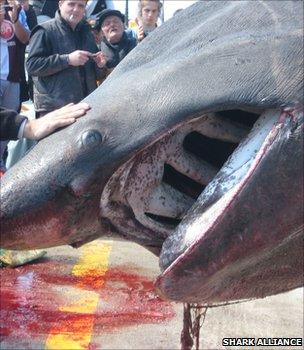MEPs vote to close 'shark finning' loopholes
- Published

Loopholes in current EU measures were not offering enough protection to sharks, said campaigners
MEPs have voted to close loopholes that allowed some EU fishing vessels to continue "shark finning".
Although the EU banned removing shark fins at sea and discarding the body, special permits allowed finning to continue legally.
Conservation groups, which said finning was threatening shark numbers, welcomed the European Parliament's decision.
The decision to back the European Commission's plans means the details will now be considered by EU ministers.
The resolution was adopted with 566 votes in favour, 47 against and 16 abstentions.
"Parliament's vote represents a major milestone in the global effort to end the wasteful practice," said Sandrine Polti, EU shark policy adviser for the Pew Environmental Group and the Shark Alliance.
"[We have] been working towards this and other fundamental reforms in European shark policies for more than six years and are thrilled with today's vote and the progress we expect to stem from it."
Dr Joanna Swabe, EU director for Humane Society International (HSI), said she was delighted that MEPs had decided not to support the argument to retain the special permits.
"This would have been disastrous for shark protection not just in EU waters but worldwide," she said.
"HSI commends the European Parliament for defending sharks against the cruel and wasteful practice of shark finning."
Shark finning is driven by the fact that the animals' fins are highly valuable in comparison with shark carcasses.
As severed fins could be easily stored, it made economic sense for fishing vessels to remove the fins at sea, rather than bringing the entire animal - which would quickly fill a vessel's cold storage areas - into port.
It is estimated that fins can sell for between 16 and 70 euros (£13- £56; US$20-90) per kilogramme in Asia.
The EU's global catch of sharks ranks second only to Indonesia, yet the European Commission has committed itself - under the EU Action Plan for the Conservation and Management of Sharks, external - to adopt the necessary measures to conserve shark species and to minimise waste and discards from shark catches.
Finning is also deemed cruel because the fins are often removed while the animal is still alive - it then drowns when it is thrown back into the sea.
Conservationists argued that the issuing of Special Fishing Permits (SFPs) that allowed fins to be removed at sea prevented the EU ban, introduced in 2003, from becoming fully effective.
According to European Parliament data, the largest number of SFPs issued to date were to Spanish and Portuguese vessels (1266 and 145 respectively, between 2004 and 2010).
It added that until 2009, the UK, Germany and Lithuania had also issued SFPs.
Ms Polti observed: "Shark Alliance member groups look forward to continued co-operation in shepherding and promoting a final 'fins-attached' rule and in securing complementary safeguards, such as domestic and international catch limits, to fully address the overexploitation of sharks."
- Published9 December 2010